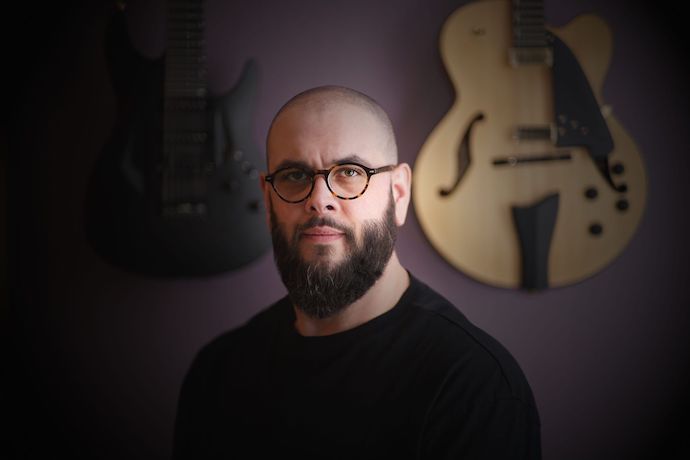
The subject of today’s post is an interview of Jesse Zuretti, the guitarist and co-creator of the musical juggernaut that is The Binary Code (whose new EP we reviewed here).
If you’re like me, when you see the word “interview” on a metal site, you sub-vocalize the words “Fuck that shit” and click away as fast as your fast-twitch muscle fibers will allow your finger to work. Why is that? If you’re like me, there are two reasons:
First, most interview questions are stupifyingly inane. Even when the interviewer actually has a functioning brain, many of them are just fucking lazy. So they ask questions that involve no thought or effort, and they get repaid in kind with the answers.
Seriously, if I were a musician and had to answer one thoughtless, cliched, repetitive, dull-as-dishwater question after another, year after year, I’d be sorely tempted to pull an Ernest Hemingway and put a 12-gauge Boss shotgun in my mouth.
Second, a person can be an extraordinarily talented artist but still be inarticulate or simply uninteresting as a conversationalist — even when the questions are halfway decent. Being really good at one thing doesn’t mean you’re really good at everything else. To step outside the realm of music, when’s the last time you read an interview of a pro athlete or a movie star that you actually found interesting, that made you think, that opened your eyes to a new idea?
That’s not intended as a put-down. It’s just a fact. Being a talented artist doesn’t automatically make you an innovative thinker or a fascinating raconteur, just as being a diehard metal fan doesn’t make you an adept interviewer. Many people who train and work hard as professional reporters still don’t make the grade as good interviewers, so why should we expect that just being a devoted fan is enough?
Why, then, should you read this interview? Is it because I’m an extraordinarily good interviewer? Well, fuck no. All I can tell you is that I tried to think of questions that weren’t the usual dreck. Whether or not I succeeded is something you should judge for yourselves.
No, the main reason you should read this interview is because of Jesse Zuretti. He’s one of those rare people in the metal scene (a) who is a naturally gifted musician and songwriter, (b) who listens to lots of music and thinks seriously about it , (c) who thinks a lot about things other than music, (d) whose opinions and ideas are unorthodox for this scene, and (d) who can express what he thinks in words that are worth reading — and that make you think. Also, even when my questions were retarded, he was patient and serious in his answers.
Well, at least that’s my opinion. You can judge all that for yourselves too — but you really shouldn’t miss this. Naturally, we start by talking about the new EP, but things go off in other directions after that. (after the jump. . . .)
INTERVIEW
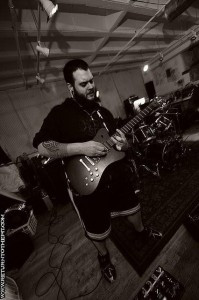 NCS: Hey Jess, thanks for carving out some time to answer our questions. The Priest EP is in the front of my head right now, so let’s start with that. A lot of time passed between the recording of “Suspension of Disbelief” back in November 2008 and “Priest”. Lots of time I suspect you and Umar [Fahim, The Binary Code’s drummer] spent listening, thinking, and playing. I’m curious about how you would characterize your musical progression between the two releases (if that’s not too broad or vague a question)?
NCS: Hey Jess, thanks for carving out some time to answer our questions. The Priest EP is in the front of my head right now, so let’s start with that. A lot of time passed between the recording of “Suspension of Disbelief” back in November 2008 and “Priest”. Lots of time I suspect you and Umar [Fahim, The Binary Code’s drummer] spent listening, thinking, and playing. I’m curious about how you would characterize your musical progression between the two releases (if that’s not too broad or vague a question)?
JZ: The progression from the Suspension album and the Priest EP took place before the release of Suspension. We had a majority of the song “Priest” written before tour with Revocation back in January of this year. We actually played half of the song on that tour (we opened with it). Since we recorded Suspension in 2008 and released it in 2009, there was plenty of time to grow during the interim.
When we got home from tour, we said we’d start writing as soon as we came back from a mere week-long break from playing. Two weeks after being home from the road, we finished up the song “Priest” and started work on “Encircled”. “Encircled” was actually written in about a day and a half worth of work. “Ocean of Light” was written before tour.
At this point, we’re already another new EP deep, and then some. I would say we’re not progressing in the same way you do when you learn something in school, but more so in a branching out kind of way. We keep digging into our influences more than anything. That’ll become more and more prevalent as the years go by.
NCS: Compared to the creative process behind Suspension, was the songwriting process or approach that you and Umar followed for the songs on Priest different? And did you find that the process was easier or faster, with more experience behind you?
JZ: The process of coming up with riffs and ideas is always easy. We can come up with a songs worth of riffs in a matter of one session. The writing process takes a while. We have a way of doing things, and it works for us, so I don’t see us every straying from that approach.
 NCS: Did anyone else contribute to the songwriting/creating process besides the two of you?
NCS: Did anyone else contribute to the songwriting/creating process besides the two of you?
JZ: For the most part, Umar and I write everything. The lyrics are a collective effort sometimes. When we were getting the newer songs ready for the tour with Revocation, Todd [Stern] (played rhythm guitar on tour with us), and Brett [Bamberger (East of the Wall] helped with the structure of a few parts in “Priest” and “Ocean of Light”.
NCS: For people who are familiar with Suspension of Disbelief, the biggest surprise on the EP is likely to be “Ocean of Light”. You guys backed off the pace on that one, and it’s got a crushing, moody, “post-rock” sound. Sounds like atypical guitar-tuning for you, too. What turned your heads in that direction?
JZ: I’m a HUGE fan of Cult of Luna and many of the other post-metal/rock bands out there. You’d actually find me looking for doom, post-metal/rock bands to check out before you’d find me looking for death metal or thrash or something. I respect a lot of the bands getting a majority of the spotlight shown on them, but I’m really not a huge fan of death metal or anything in the extreme realm. When I do find a band playing death metal or something extreme, it’s usually something with a lot of musical enthusiasm, so to speak. Like new Defeated Sanity or the most recent Suffocation album. I’d expect plenty more “Ocean of Light” style songs from us, with more detail and structure. We already have a few new tracks in the works similar to that style.
NCS: The EP’s title track is as technical as anything on Suspension, if not more so, but I also thought it was catchy as hell, and both your playing and Umar’s sound almost improvisational. I suspect you guys are capable of playing just about any style of music you put your minds to (as I think “Ocean of Light” shows), but when you wrote and selected the songs for Priest, did you have in mind trying to solidify a “signature” sound for The Binary Code (which I would characterize as a blend of tech-death, prog, and improv)?
JZ: We based “Priest” off of the opening riff. It pretty much demanded that we write the rest of the song by flowing from one riff into the other, one by one. It ended up being our new “Ghost Planet”, so to speak. “Ghost Planet” had the same turn out, in my opinion. Improvisation didn’t really have anything to do with it. We are very calculated in our attack when we write a song and record it. The only thing that ever ends up being moderately improvisational are solos or leads.
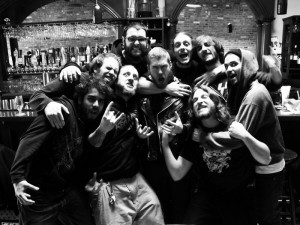 NCS: While we’re talking about “Priest” (the song), I have to say I nearly busted my gut laughing when I first heard the “Nintendo version” of the song at the end of the EP. It really does sound like the “tunes” on the first Mario Bros. game on that 8-bit Nintendo console. What in the world put the idea in your heads to create that Nintendo version of the song?
NCS: While we’re talking about “Priest” (the song), I have to say I nearly busted my gut laughing when I first heard the “Nintendo version” of the song at the end of the EP. It really does sound like the “tunes” on the first Mario Bros. game on that 8-bit Nintendo console. What in the world put the idea in your heads to create that Nintendo version of the song?
JZ: It was actually an idea conceived by our manager, Ben. He thought it was a cool idea to have something extra for people.
NCS: Although I laughed the first time I heard the “8-bit” version, the more I listened to it, the more I realized that it’s almost a note-for-note replica of all the instrumental tracks on the original version of the song – including little retro electronic versions of Umar’s double-kicks and blast-beats and cymbals. Who transcribed and transformed the original song into that 8-bit version and how the hell was it done?
JZ: Whenever we finish writing a song, I always transcribe everything I can to the best of my abilities using a tabbing program, like Guitar Pro 5 or Tabit. It helps me get to know the riffs and the numerical aspect much more when I do this.
I’m a frequent poster on the SMNnews forums (been a member since 2004). I’m actually a “moderator” on the Between the Buried and Me forums (where the majority of my posting takes place). There are a lot of really in-the-know dudes on there posting super sweet stuff, ranging from movie recommendations, music recommendations, and other cool stuff, like…the program to transfer MIDI to an 8-bit sound. A dude named Pwnsauce on the forums posted a link to download the program, I believe. That’s how I remember it at least!
All of those guys collectively rule, as lame as it may sound to be so into a forum. They are always supportive of what we’re doing (as a band), and even me as an individual. I wouldn’t recommend passing off the opportunity to get involved with a forum filled with people with a lot of similar interests in just about everything.
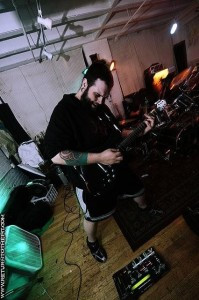 NCS: Do you think 8-bit mixes of metal songs have a future? 🙂
NCS: Do you think 8-bit mixes of metal songs have a future? 🙂
JZ: I doubt it. I hope not! I think it’s a cool thing to do if you can, but not as a tool to market your band. I’m not sure how I feel, actually. HAHA
NCS: The third song on the album, “Encircled”, is different again from the other two, though in its style it reminded me of parts of “Suspension of Disbelief (Part II)”. It has the same kind of swirling guitar lead that eventually kicks in – I don’t mean the same melody but the same technique – plus on “Encircled” it’s joined by a second guitar track that I can only call an anthem. Since I know almost nothing about guitar technique, could you describe what the hell you did on this song to generate all the diverse sounds?
JZ: To be honest, since I’m not exactly sure as to what you mean by “swirling guitar lead”, I don’t think I can actually answer that to my fullest potential. If you’re referring to the tapping part of the song towards the end, I can try and explain it.
Essentially, I start the tapping part of the near ending of the song on the lowest string of the guitar (we’re tuned DADGBE, so on the low D string). I’m tapping triplet groupings of notes, middle finger on the picking hand, pointer & pinky on the fretting hand. Tapping in a series of triplets, grouped three notes per repetition.
Towards the very end of the song where the lead guitar kicks in, I am tapping the triplet patterns on three strings, one string into the next highest string, into the final higher string of the progression, and back down. Those strings would be, again, the low D, the A, and 4th string, the other D (in the middle of the string order). It’s a pretty common technique, as far as I know.
NCS: The solitary piano melody that rounds off the ending to “Encircled” fits the rest of the song, at least to my ears, though it’s not an obvious way to end at all. Who is playing the piano? Who wrote the melody? And, if you remember, how did you guys conceive of finishing the song in this way?
JZ: I played the piano parts. I wrote the melody as well. I felt the song should end that way. I wrote the original progression with all of the tapping based around the chord progression first. So the progression actually came last. I felt the vibe of the song ending without some sort of dynamic change would be selling the song short. We’re really happy with how it ended. Has a… “less cool” Faith No More vibe to it, I think. Certainly not influenced by them for that particular part, but it has a similar sound to it, I guess.
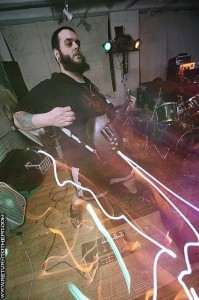 NCS: You mixed and mastered Priest yourself. Would you do that again? Was it fun or a big fucking headache? Do you see any advantages in doing it yourself (apart from saving the money you’d have to pay someone else to do it)?
NCS: You mixed and mastered Priest yourself. Would you do that again? Was it fun or a big fucking headache? Do you see any advantages in doing it yourself (apart from saving the money you’d have to pay someone else to do it)?
JZ: It was not my favorite thing to do, that’s for sure. I also can’t take full credit, because Paul Cutri did a lot of the early mixing. I kind of worked with him to get to the middle point, and then I just finished up after a month or so away from the songs. I had to stop listening to them in order to refresh my ear from the fatigue you can undergo from listening too much. I highly doubt this will happen again the future, unless it’s a personal recording done by myself outside of Binary Code.
There are plenty of advantages and disadvantages. The advantage is the money aspect. And you also get to personalize what you hear. The disadvantage is most certainly the bias you create. You need to be able to objectively hear your music. I see it as a disadvantage more than anything.
We’ve been recording ourselves with Paul’s assistance and generosity for a few years now. I think we’ll be outsourcing next time around. I’m completely unschooled when it comes to recording and mixing. I don’t own gear, and I don’t work for a studio. I simply learned what I know from recording numerous times over the course of 7 years. That’s all I have to offer, haha.
NCS: I’ve read more than once that you guys count Genesis as an influence. I think the Genesis albums that were made before Peter Gabriel left the band are just amazing (the ones after aren’t bad either, but they weren’t as revolutionary as the ones before). I must have listened to The Lamb Lies Down On Broadway a hundred times – in a row. Do both you and Umar count Genesis as an influence, or is it just one of you, and why do you count that band as an influence?
JZ: I’m mostly a fan of Duke, which is post-Gabriel. That’s not to say the pre-Gabriel stuff was not amazing. I’m a huge fan of what those guys had to offer. Duke is an amazing exploration in experimentation, in my opinion.
Phil Collins is a very talented guy, with amazing song-writing abilities. I can sing pretty much everything on that album, front to back. I’m not that sweet with lyrics usually, but the music demanded I memorize the words. Umar, from what I can tell, has no interest in Genesis. I haven’t discussed them with him before, and we discuss music more than anything.
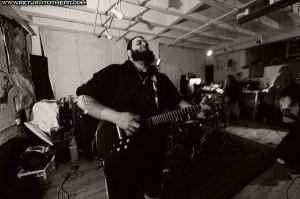 NCS: Now a couple questions that are a bit off-topic. I follow what you write on Facebook. You said in one recent comment that there aren’t many metal bands in your Top 10 list of albums for the year so far, with Defeated Sanity being an exception. (I would sure as hell agree that Defeated Sanity is a massive kick in the head.) I don’t want to put you on the spot and ask you to fill out the entire balance of your list, but tell us two other albums you would put in your Top 10 of the year so far and why.
NCS: Now a couple questions that are a bit off-topic. I follow what you write on Facebook. You said in one recent comment that there aren’t many metal bands in your Top 10 list of albums for the year so far, with Defeated Sanity being an exception. (I would sure as hell agree that Defeated Sanity is a massive kick in the head.) I don’t want to put you on the spot and ask you to fill out the entire balance of your list, but tell us two other albums you would put in your Top 10 of the year so far and why.
JZ: I love the handful of metal bands that I do actually make a point to listen to, but I’m not the biggest metal fan out there, by leaps and bounds. I find myself searching for music outside of extreme, heavy, and fast music. But I still do fancy myself some death metal when the band is right.
It took me a while to understand what the big deal was about Defeated Sanity, but it certainly kicked in hard this year with their newest release.
My Top 10 Contenders (in the heavy realm, save for Jaga Jazzist, which is a sure top spot): East of the Wall – Ressentiment; Jaga Jazzist – One Armed Bandit; Ihsahn – After; Mantric – the Descent; Yakuza – Of Seismic Consequence; Kruger – For Death, Glory, and the End of the World; Xasthur — 2005 Demo; and Castevet — Mounds of Ash. Maybe Ion Dissonance or The Acacia Strain.
I almost wish I could go back to 2009 and add Blood Oath by Suffocation to my top 10. That album RULES!!!
NCS: One more question I have to ask based on your Facebook posts. You seem to have a fairly poor opinion of humankind in general, even fantasizing about making human existence cease to exist. Where does that outlook come from? And do you think it enters into the music you create?
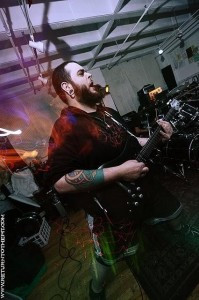 JZ: I absolutely hate human beings. It’s undebatable, and completely worthless to ever try and change my perspective. Unless something extroardinary happens that proves me wrong, I’m adamant in my disposition.
JZ: I absolutely hate human beings. It’s undebatable, and completely worthless to ever try and change my perspective. Unless something extroardinary happens that proves me wrong, I’m adamant in my disposition.
I simply understand that life is what it is, and I have to deal with how society has made things for us. I would not invest a single ounce of confidence in the human race, from the beginning of time to the day it all comes to an end for us (if it does). I’m an all-or-none kind of guy when it comes to this perspective.
I don’t want a handful of people to suffer, only for other humans to continue existing. If we need a social climate change, I would prefer it to be every single one of us. I include every man, woman, and child into this equation.
I have no compassion for humans as a whole. As we all do, I find there to be certain humans worth investments. As I age, this number will probably plummet. But for the most part, I am very pleased with the humans I keep in my life right now.
I plan on living my life through my own eyes. I’m a happy guy, but I’m also very angry about a lot of things. I’m very happy to be alive, and to experience life for what it is, but I feel it’s all at the convenience of innocent organisms trying to exist peacefully without tyranny brought on by selfish, materialistic, dogged humans.
My intention is to continue my life to the best of my abilities, and deal with it. This won’t stop me from expressing my feelings, and hopefully opening some eyes. I’m not very good at hiding my feelings about this towards most humans. I think we’re an infection, and I really don’t want to hear otherwise for that matter, until it’s proven to me that we serve more of a purpose beyond human-benefit. I plan to write more about my philosophies on the matter at some point.
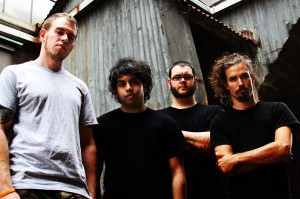 NCS: I know you think beyond the next week or even the next six months. So let me ask you one of the really nasty questions of the hour, which I’ve been thinking about a lot since I read Ryan McKenney’s post on MetalSucks earlier this week: How do you see being able to continue
NCS: I know you think beyond the next week or even the next six months. So let me ask you one of the really nasty questions of the hour, which I’ve been thinking about a lot since I read Ryan McKenney’s post on MetalSucks earlier this week: How do you see being able to continue
doing what you’re doing, when most of the people who hear your music don’t pay for it, when touring may — I say may – only generate enough scratch to pay the expenses, and when the kind of day job that accommodates the unpredictable life of a touring musician pays peanuts?
JZ: Honestly, if you can’t deal without having the “finer things in life”, don’t try music as a profession. I’m a pretty bare-bones guy at this point. I’ve had my bouts of materialism and frivolous tendencies, but those days are long gone.
I loved being on tour, and I’m willing to live like a homeless person if I have to do so in order to continue doing that. If it ever gets to the point where it’s more comfortable to tour, that’s just a bonus. But for the most part, you can be a successful band when it comes to touring.
East of the Wall should write a fucking book on that. Those guys are the most professional bunch of musicians I know personally. Brett [Bamberger] is one of the best people I’ve ever met in my life, and he lives life to the fullest, whilst maintaining a job, paying mommy & daddy-sized bills, and touring the country almost 75% of the year. If you can find a band like East of the Wall to model your business aspect of your band after, you’ll be fine.
********
The Binary Code’s new EP Priest will be officially released by the band on August 10. You can pre-order Priest here as a digital download, or as a download and t-shirt package.

Dude, you nailed that. You don’t give yourself nearly enough credit. Your writing is top notch and your questions were indeed well thought out and not of the norm. It was a highly interesting and entertaining read. Keep up the interviews. I would love to read more. This is the first website I check in the morning and even if I don ‘t care for the bands that you post, your writing is so good that every post is a must read.
I may not be the biggest fan of The Binary Code, but Jesse is a legit guy who stands up for what he believes in and is not ashamed to say so. I guess it helps that I agree with him on some of the things he has to say about humanity as a whole. But it also says something about him that he can look past the whole to find some good in the waste that occupies most of this world. I will have to give his work a more dedicated listen, because I can get on board with an artist like him, even if his style of music doesn’t fit my preferred tastes.
Hey, thank you, you just made my day! And Jesse is indeed a legit guy. I’m hoping to convince him to write something for us when the spirit moves him.
1.) I agree with d_e about what you managed to come up with. It’s hard to come up with something that isn’t populated with mostly cookie cutter questions – and sometimes even harder to keep from getting carried away when you do manage to go beyond the usual. Of course, having a subject open to the usual and unusual questions helps a lot.
2.) While I may share some of Jesse’s views on how much humanity sucks, I’m nowhere near as misanthropic as he seems to be. I learned years ago that the longer you keep telling yourself something – or the longer you keep hearing it – the chances of believing it go up. Yes, mankind does have a lot of bad aspects, but there’s a lot of good in us as well and to think that the shit outweighs the good doesn’t really get you anywhere. I went down that road once and decided it was better to try to take a detour back to a road with fewer potholes, else I might have ended up dead.
(A) Thank you. It’s comments like this one and d_e’s that keep me doing this.
(B) Your No. 2 (and Jesse’s comment to which it relates) is a subject that’s as deep as the Atlantic Trench, but very important. I don’t preach much on this site, because I don’t think anyone comes here to get a preaching. But I’ve basically got a foot in each camp. I completely understand Jesse’s perspective, and the truth is that most of us will always care vastly more about individual people than abstractions about people in general, even if we don’t honestly admit it. On the other hand, I’m an eternal optimist and I’m wired to see the good things in most people I meet, even when it’s a small fraction of the whole person. That kind of perspective can lead to lots of disappointments, but I wouldn’t change it.